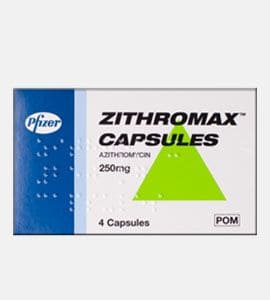Zithromax (Azithromycin)
Zithromax is a semi-synthetic macrolide antibiotic chemically related to erythromycin. It is effective against a majority of species of gram-positive and gram-negative microorganisms, including genera such as Staphylococcus (e.g., S. aureus, S. pneumoniae, S. pyogenes, S. agalactiae), Haemophilus (e.g., H. influenzae, H. parainfluenzae), Moraxella catarrhalis, Bacteroides fragilis, Escherichia coli, Bordetella spp., Borrelia burgdorferi, Haemophilus decree, Neisseria gonorrhoeae, and Chlamydia trachomatis. In vitro, it also shows activity against Legionella pneumophila, Mycoplasma pneumoniae, Helicobacter pylori, Toxoplasma gondii, and Ureaplasma urealyticum. As a macrolide antibiotic, Zithromax inhibits bacterial protein synthesis and prevents bacteria from growing and propagating. It is used to treat infections of the upper and lower respiratory tract (e.g., tonsillitis, otitis, sinusitis, pneumonia), urogenital infections (e.g., urethritis, prostatitis, cervicitis, adnexitis caused by chlamydia, gonorrhea, early syphilis), intestinal infections, and ulcers of the stomach and duodenum.
Dosage and Directions
Take exactly as prescribed and do not discontinue your treatment even if you feel fine and your symptoms improve without the permission of your doctor. Take Zithromax tablets with a large glass of water. To prepare the liquid suspension form, mix one packet with 2 ounces of water, shake, and drink at once. Do not use the suspension if it was prepared more than 12 hours ago. Tablets and suspension can be taken with or without food, while capsules should be taken on an empty stomach 2 hours before or after a meal.
Precautions
There is no evidence on whether Zithromax affects an unborn baby or is excreted in breast milk. This medication should be used in pregnant and breastfeeding women only if the expected benefit outweighs the potential risk to the baby.
Contraindications
Hypersensitivity to Zithromax and related drugs such as azithromycin or erythromycin.
Possible Side Effects
Side effects may include:
- diarrhea or loose stools
- nausea
- abdominal pain
- vomiting
- uneven heartbeats
- loss of appetite
- dark urine
- clay-colored stools
- jaundice
- fever
- rash
- red skin
- headache
Contact your doctor and inform them about such symptoms or seek immediate medical attention.
Drug Interactions
Zithromax is not recommended to be taken with aluminium- or magnesium-based antacids, such as Mylanta or Maalox, as they decrease its absorption in the intestine.
Missed Dose
Take the missed dose as soon as you remember. If it is almost time for the next dose, just skip the missed dose and return to your regular schedule.
Overdose
Symptoms of overdose may include nausea, vomiting, diarrhea, and stomach discomfort. Seek immediate medical attention if these symptoms occur.
Storage
Store at room temperature between 59-77°F (15-25°C), away from light and moisture, and out of reach of children and pets. Do not store the liquid for longer than 10 days.


 English
English
 Italiano
Italiano
 Español
Español
 Français
Français
 العربية
العربية
 Čeština
Čeština
 Deutsch
Deutsch
 KRW
KRW



















